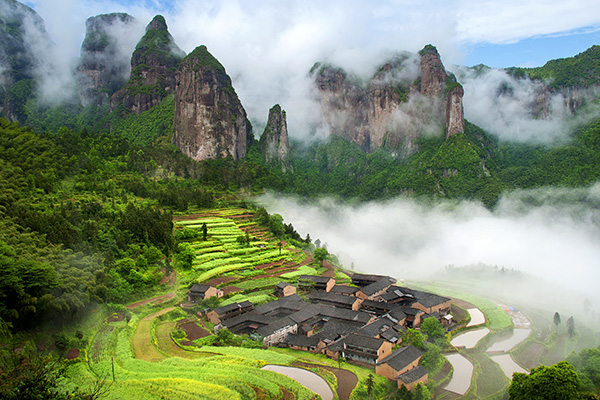Villages reap benefits of ecological planning

The Gongyuyan scenic spot offers spectacular views including a stone forest and the Shenlong waterfall in Tianshi township, Xianju county.[Provided to China Daily]
When President Xi Jinping was serving in Zhejiang province 11 years ago, he once said: "Lucid water and lush mountains are invaluable assets." He was suggesting that a green environment would help people become wealthy.
That statement has been turning into a reality in recent years in Xianju county, in southeast Zhejiang, as the county's efforts in protecting the environment have become a major driver for the development of local agriculture and tourism.
"For many years, the lack of convenient transportation has been an obstacle for the development of our county," says Zhu Huwei, the director of the county's policy research department.
"But it left us with a big advantage-a well-preserved environment and ecology-when the transportation infrastructure improved in the last decade. Now, all of our planning strategies are based on green development, especially eco-tourism combining with green agriculture."
The large balcony facing Shenxianju Mountain and Weiqiang River is Jiang Wufei's favorite place at Time's Inn, a boutique guesthouse renovated from a local farmer's house, in the county's Danzhu village.
"Tourism is getting popular here as I notice each time I come home," says Jiang, 44. He is a local resident who went to work in a guesthouse in Xiamen and returned to open his own last year, just as the nearby Shenxianju geopark became China's top-rated 5A tourist attraction last October.
Jiang rented the house from an old couple whose children did not work in the village and the four-story property was left largely empty.
"We get rent of 85,000 yuan ($12,700) a year," says the house owner Xia Ju, 66, who keeps one floor for his family's use. "We are very happy to see the house look much nicer after the renovation."
Summer is the peak tourist season in Xianju. "People come to hike in the mountains, swim in the river, and enjoy the fresh air here," says Jiang. "In June, when Xianju's famous waxberries were ripe and fruit picking trips were popular, all of our rooms were booked out."
Jiang is not the only one who sees opportunity in Xianju. There are around 100 guesthouses in the village, according to Zheng Yi, Danzhu's publicity officer.
From 2013 to 2015, the number of tourists to Xianju grew at an average of 42.8 percent annually. Last year, around 20 million people visited the county and revenue from tourism reached 10.3 billion yuan ($1.5 billion), according to Zhejiang Daily report in July.
In the past few years, the county has been shifting its agriculture from low value-added crops to more profitable fruits, vegetables and flowers.
Near the county town, the 840-hectare Xianju Agriculture Experiment Park for Taiwan Farmers is home to a variety of tropical fruits-including lychee, dragon fruit and guava.
"We had businessmen from Taiwan invest in the park to grow orchids, and professors from Zhejiang University planting precious herbs here," says Xu Zhihao, a guide at the park. "And there are restaurants offering food made from organic produce harvested here."
Built in 2010, the park has provided 2,000 jobs for local farmers, and its output reached 100 million yuan in 2015.
Influenced by the county government's advocacy for green agriculture, individual farmers have also been actively exploring new methods in their own businesses.
Wang Wenfei has been growing organic grapes for six years. This year, he took up the latest fad-installing a camera in the vineyard and live broadcasting the growth of his grapes online.
"Although my grapes are not as big and nice as others on the market," says Wang. "That's because I use as little pesticide as possible, and people can see that directly."
Wang's method has been so effective that more than 3,000 people came to his vineyard for grape picking this summer, and he sold more than 5,000 boxes of grapes online.

 Print
Print Mail
Mail
 20 Cultural Symbols
20 Cultural Symbols Why Zhejiang
Why Zhejiang Experiencing high-tech products at WIC
Experiencing high-tech products at WIC Zhejiang Release
Zhejiang Release Zhejiang News
Zhejiang News